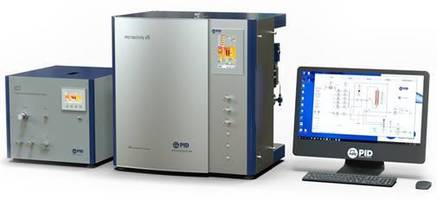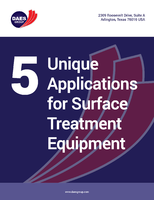New Catalyst Characterization System Integrates Chemisorption and Temperature-programmed Techniques
Press Release Summary:

- Allows researcher to efficiently quantify the impact of reactions on defining catalyst parameters such as number of active sites
- Incorporates mass flow controllers for fully automated precise gas control and a cold trap for the removal of condensable vapors
- Permits in situ chemisorption measurements by pulsing a probe gas using loop valve
Original Press Release:
New in situ Catalyst Characterization System Delivers Novel Test Capabilities for Heterogeneous Catalysts
Direct Assessment of the Impact of Reaction Conditions on Critical Catalyst Properties Without Discharging the Sample from the Reactor
Norcross, GA, USA – 24 October 2019 - Micromeritics Instrument Corp., a global leader in material characterization technology, has launched the new in situ Catalyst Characterization System (ICCS) to deliver novel test capabilities for the reliable and industrially representative investigation of catalyst behavior. The new system is the product of the combined expertise of Micromeritics and PID Eng & Tech, a company recently acquired by Micromeritics and renowned for its microreactor and pilot plant technology. By integrating seamlessly with the PID Microactivity Effi, an advanced catalyst screening system, the ICCS allows researchers to efficiently quantify the impact of reactions on defining catalyst parameters such as number of active sites. The resulting data directly support the development of more effective heterogeneous catalysts.
“Micromeritics’ chemisorption systems are used the world over to apply tried and tested techniques such as Temperature Programmed Analyses and Pulse Chemisorption,” said Jeff Sherman, Vice President, Business Development at Micromeritics. “The Microactivity Effi, on the other hand, is a highly automated catalyst screening tool for measuring yield, conversion, selectivity and catalyst regeneration under process relevant conditions. The ICCS integrates chemisorption and temperature-programmed techniques like TPR, TPO and TPD with the existing capabilities of the Microactivity Effi making it possible to characterize a catalyst, test it, and then re-characterize it to assess the impact of reaction. All under precisely controlled conditions with no risk of contamination from the external environment.”
The ICCS incorporates mass flow controllers for fully automated precise gas control and a cold trap for the removal of condensable vapors. A precision thermal conductivity detector monitors changes in the concentration of gases flowing into and out of the sample reactor. The ICCS can be connected to any microreactor testing system, even custom-made units, to deliver important information on the catalyst under test, in situ.
When plumbed directly to the Microactivity Effi, the ICCS allows in situ chemisorption measurements by pulsing a probe gas using a loop valve. Analyses can be carried out on catalysts; catalyst supports and other materials without any risk of exposure to the external environment since there is no requirement to discharge the sample from the reactor. This eliminates the possibility of contamination from atmospheric gases and moisture which may damage an active catalyst and compromise data integrity. Temperature programmed experiments including temperature-programmed reduction (TPR), temperature-programmed oxidation (TPO) and temperature- programmed desorption (TPD) can be performed at atmospheric pressure or up to 20 bar pressure (depending on the pressure rating of the associated screening system), providing important information about the redox properties of a catalyst at high pressure. Multiple characterizations of the same material can be carried out using the same sample.
“We’re keenly aware of the value of comparing the number of active sites on a catalyst before and after use,” added Sherman “and we’re delighted to now offer a tool that makes such measurements straightforward and reliable. Our broader goal is to offer a truly comprehensive and optimized suite of instrumentation that runs from core catalyst characterization systems to customized pilot plant. This accessory is an important part of these capabilities.”
About Micromeritics Instrument Corporation
Micromeritics Instrument Corporation is a global provider of solutions for material characterization with best-in-class instrumentation and application expertise in five core areas: density; surface area and porosity; particle size and shape; powder characterization; and catalyst characterization and process development.
The company is headquartered in Norcross, Georgia, USA and has more than 400 employees worldwide. With a fully integrated operation that extends from a world-class scientific knowledge base through to in-house manufacture, Micromeritics delivers an extensive range of high-performance products for oil processing, petrochemicals and catalysts, to food and pharmaceuticals, and works at the forefront of characterization technology for next-generation materials such as graphene, metal-organic-frameworks, nanocatalysts, and zeolites. Under its premium brand Particulate Systems, Micromeritics discovers and commercializes innovative material characterization technologies that are complementary to core product lines. Cost-efficient contract testing is offered via its laboratory Particle Testing Authority (PTA).
The strategic acquisitions of Freeman Technology Ltd and Process Integral Development S.L. (PID Eng & Tech) reflect an ongoing commitment to optimized, integrated solutions in the industrially vital areas of powders and catalysis.
Contacts:
Peter Nasca, APR
PersistencePR, LLC
954-446-7060
954-557-2966 (cell)
800-248-3560
888-436-0064 (fax)
pnasca@persistencepr.com
Petra Roth
+49 0 89954537780
petra.roth@micromeritics.co



